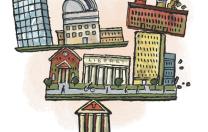Could the new learning technologies, combined with new higher education models, disrupt the most selective, elite institutions—like Harvard?
Institutions that derive their value from being selective, rather than from serving people in volume, tend to be more immune from disruption. For example, when previously great companies such as Digital Equipment Corporation and RCA’s consumer electronics powered by vacuum tubes (television sets, for instance) were displaced, they proved vulnerable because their customers fled en masse to disruptive innovations: the personal computer and Sony’s consumer electronics powered by the transistor. Harvard College, on the other hand, fits squarely into a description of a luxury service whose value is derived from the fact that it only serves a limited few.
But the process of disruptive innovation has spelled the decline of many dominant and successful organizations. Harvard might not be different—or not so different that it can readily escape a serious decline. It suffers from many of the same challenges plaguing many nonselective institutions of higher education: conflated business models that have led to continually rising costs and tuition increases over the years, and improvements dependent on continuing alumni gifts and endowment performance that have allowed the College to remain affordable through such mechanisms as financial aid.
Institutions like Harvard Business School might be particularly vulnerable. Consider the different reasons or jobs for which people might “hire” business education. Some need help with a relatively specific business problem or question; others want to learn how to be a great general manager; many need a credential to obtain their next promotion; still others want help switching careers. And still more people “hire” business education for the brand and connections of a prestigious alumni network.
The fundamental shift in the business education market began with the solving of that first job—helping employees with a relatively specific business problem or question—through the advent of in-house corporate universities. And, as disruptors do, corporate universities are both improving and expanding to serve people outside of their companies in some cases. Business schools may not feel it yet, but the corporate university is beginning to take on the second and third jobs we listed for which people hire business education—learning to be great general managers and attaining the credentials necessary for a promotion.
The corporations that created these universities have historically been the source for the majority of clients enrolled in traditional executive-education programs at business schools, often the cash cows of such institutions. With an education option now readily available at the corporate universities, however, employers are less and less eager to send potential executive-education students to a traditional business school program. Already many business schools are seeing declining executive-education enrollments.
The spillover effect could be devastating to faculty research and the M.B.A. program itself. For example, as the executive-education funds that subsidize the M.B.A. program dry up, the cost of the traditional business degree would have to increase even faster than it does today. Even more students might then have to find their business educations through other means, such as part-time M.B.A. programs and, increasingly, online programs that have far lower opportunity costs (students can enroll while continuing their jobs) and tuition prices students can justify given the salaries they will likely make. In this context, an M.B.A. from Harvard just might not have the same return on investment—or elite cachet.








